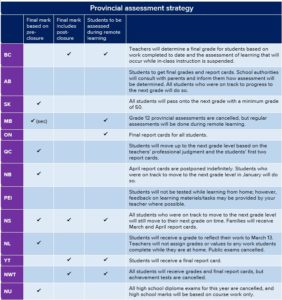To grade or not to grade: Assessment in a Pandemic
 With most schools across the nation closed until further notice, provinces and territories differ in their assessment and reporting policies in response to COVID-19. At the time of this article, some provinces and territories, including Ontario, have said that all students will receive grades and final report cards, whereas others like New Brunswick have postponed report cards indefinitely. Regions also differ in whether students’ marks will be determined based on work completed before schools closed in March (such as Quebec and Newfoundland and Labrador) or work done after the school closures (such as the Yukon and Nova Scotia).
With most schools across the nation closed until further notice, provinces and territories differ in their assessment and reporting policies in response to COVID-19. At the time of this article, some provinces and territories, including Ontario, have said that all students will receive grades and final report cards, whereas others like New Brunswick have postponed report cards indefinitely. Regions also differ in whether students’ marks will be determined based on work completed before schools closed in March (such as Quebec and Newfoundland and Labrador) or work done after the school closures (such as the Yukon and Nova Scotia).
Read more about the provincial and territorial responses to COVID-19 in our tracker.
In Nunavut, high school diploma exams have been canceled so final marks will be based solely on course work, and Manitoba has announced that final report cards will indicate whether students require “recovery learning”.
But even where a province may have laid out a reporting strategy, school boards may differ. The Toronto District School Board, for example, has stated that elementary students’ grades on June report cards will be based on their learning up until schools closed in March. For grade 12 students applying to college and university, their marks will be available in time for the application deadline and will also be based on work done up until March 13th. High school students will continue to receive assignments, which teachers will mark, but those marks will only affect final report cards if they show improvement. No students’ marks will go down based on work done after schools closed.
…teacher feedback, not grading, is what must be preserved as the COVID-19 crisis deepens.
Louis Volante, The Conversation
Comments are better than grades
Feedback is vital to the learning process, whether it is a burn from touching a hot element, squiggles underlining misspelled words in a document, or comments provided by a history teacher on an essay. One type of feedback students receive throughout school is marks. But a C- or 82% gives limited information to the learner. Specific comments can be much more powerful than grades in telling students where to focus their attention when they are still in the process of improving.
In a classic study of the effects of comments and marks on academic performance, Ruth Butler conducted an experiment where grade 5 and 6 students received either a) marks, b) comments, or c) marks and comments after working on a task. Those who received comments (rather than marks or the comments/marks combo) both performed better and were more interested in the task than their peers.
At a time when all students are learning at different paces and in different circumstances, detailed and informative feedback is of the utmost importance to keep learning going.
While all types of assessment of student learning are important, the need for formative assessment right now is particularly critical because learning needs to take place outside of the physical classroom, and teachers and parents-turned-teachers need to understand whether students are absorbing the content that is delivered to them in formats that differ from business-as-usual.
The Canadian Assessment for Learning Network (CAfLN) released a set of suggestions for assessment and reporting policies while schools are closed, including:
- No marks in elementary or middle schools. Rather, teachers would give narrative reports, which would communicate important information to the learner, their family, and future educators.
- Incomplete, Pass, and Pass with Distinction in secondary schools. This format would allow students to earn their credits based on what work they completed before schools closed. If students had not yet demonstrated sufficient learning to earn a credit, they could keep working remotely until they earn the credit. Students may also be given the option to earn a “Pass with Distinction” by engaging in enrichment activities.
Are we assessing students’ work or students’ homes?
With schools closed, students who don’t have these things at home, lose their access to practical resources such as books, WiFi, and computers, as well as other forms of enrichment including things like arts programs and clubs. Students also lose access to support staff such as school psychologists and social workers and things like breakfast programs and sports activities.
While all students are working at home, the equalizing force of public schools is snuffed out. Experts, therefore, caution against evaluating learning while students are working remotely.
…it is unethical and unjust to hold students accountable for learning the same things at the same rate and assessed by the same exams because their learning environments are so unequal as a result of their home background.
Extraordinary policy for extraordinary times
When considering assessment during this pandemic, it is vital that systems, policy-makers, and educators consider the vast differences in students’ and families’ situations, as well as the fundamental importance of supporting students’ health and well-being. One-on-one assessment and support can engage and encourage a student, but there appears to be a strong argument against adding to the pressure and exacerbating the inequities that already exist by marking students based on the work they’re doing during these extraordinary times.
